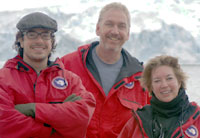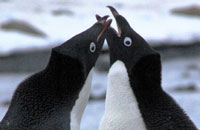 |

For further information, contact the MBL Communications Office at (508) 289-7423 or e-mail us at comm@mbl.edu
For Immediate Release: November 30, 2009
Contact: Diana Kenney, MBL, 508-289-7139; dkenney@mbl.edu
From the Front Lines of Climate Change: MBL Logan Science Journalism Fellows Report from Antarctica
 |
 |
 |
Photos:
Click on thumbnails for high-resolution images.

MBL Logan Science Journalism Fellows at Palmer Station Antarctica, December 2009. Left to right: Jason Orfanon, National Public Radio; Scott Canon, Kansas City Star; Angela Posada-Swafford, Muy Interesante. (Photo by Jon Brack)

Adélie penguins on Torgersen Island, the site of long-term studies of penguin ecology and populations as part of the Palmer LTER. As sea ice cover has declined, the island's Adélies have declined from 15,000 pairs in 1975 to less than 3,000 pairs today. Adélie penguins depend on sea ice not only because it supports the main staple of their diet (krill), but because the sea ice is a platform that allows the birds to reach critical feeding hotspots. (Photo by Chris Neill)
LINKS:
MBL Logan Science Journalism Program
A Palmer Field Journal: The MBL Science Journalists' Antarctica Blog
Palmer Station Antarctica Long-Term Ecological Research Project
Chris Neill, director of the MBL Logan Science Journalism Polar Program and scientist in the MBL Ecosystems Center
Hugh Ducklow, director of the Palmer Station LTER and director of the MBL Ecosystems Center
US Antarctic Research Program
US Long Term Ecological Research Network
|
MBL, WOODS HOLE, MA—Three journalists arrived Friday at the research site Palmer Station Antarctica, where they are witnessing firsthand what scientists from the Marine Biological Laboratory (MBL) and other places are documenting: The ecosystem there is changing—very fast.
Nowhere are the impacts of a warming climate more starkly visible than in Antarctica, where continued ice loss is having dramatic effects that reverberate all through the food web, from plankton to penguins.
Over the next three weeks, the journalists, who are recipients of an MBL Logan Science Journalism Program fellowship, are working closely with MBL environmental scientists at Palmer Station Antarctica. They will get hands-on training in some of the methods of ecosystems science, and observe first-hand how long-term research at Palmer Station is documenting a changing world.
The journalists are Scott Canon from the Kansas City Star; Jason Orfanon from National Public Radio; and Angela Posada-Swafford, from the Spanish magazine, Muy Interesante.
"Long-term measurements tell the story here," says Chris Neill, director of the Logan Science Journalism Polar Program in Antarctica and a scientist in the MBL's Ecosystems Center. Palmer Station is the site of the National Science Foundation-supported Palmer Antarctica Long-Term Ecological Research (LTER) project under the direction of Hugh Ducklow, director of the MBL Ecosystems Center.
"The Antarctic Peninsula is warming faster than anywhere else on Earth," Neill writes in the program's blog, A Palmer Station Field Journal. "Average temperature has warmed 6 degrees F since 1950. Winter temperature has warmed even more, a shocking 11 degrees F. The amount of sea ice along the western Antarctic Peninsula has declined 40 percent and ice cover is 80 days shorter, compared with 25 years ago," he writes.
"The rapid loss of ice at the ends of the world will very well be the story of the century," Neill writes. "If the Earth loses too much ice, we tumble headlong into uncharted territory."
Stunning photos, videos, and the journalists' dispatches from the front lines of climate change can be seen at the Logan SJP program's Palmer Station blog.
The journalists and Neill will be in Antarctica until Dec. 18, which coincides with the United Nations Climate Change Conference in Copenhagen (Dec. 7-18).
The MBL is a leading international, independent, nonprofit institution dedicated to discovery and to improving the human condition through creative research and education in the biological, biomedical and environmental sciences. Founded in 1888 as the Marine Biological Laboratory, the MBL is the oldest private marine laboratory in the Americas. For more information, visit www.MBL.edu.
Links to SJP Fellow blogs:
www.muyineresante.es
www.maloka.org
www.scottcanon.blogspot.com
www.npr.ogr/pictureshow
|